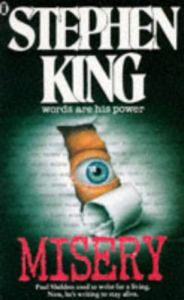In Misery, as in The Shining, a writer is trapped in an evil house during a Colorado winter. Each novel bristles with claustrophobia, stinging insects, and the threat of a lethal explosion. Each is about a writer faced with the dominating monster of his unpredictable muse. Paul Sheldon, the hero of Misery, sees himself as a caged parrot who must return to Africa in order to be free. Thus, in the novel within a novel, the romance novel that his mad captor-nurse, Annie Wilkes, forces him to write, he goes to Africa--a mysterious continent that evokes for him the frightening, implacable solidity of a woman's (Annie's) body. The manuscript fragments he produces tell of a great Bee Goddess, an African queen reminiscent of H. Rider Haggard's She. He hates her, he fears her, he wants to kill her; but all the same he needs her power. Annie Wilkes literally breathes life into him. Misery touches on several large themes: the state of possession by an evil being, the idea that art is an act in which the artist willingly becomes captive, the tortured condition of being a writer, and the fears attendant to becoming a "brand-name" best selling author with legions of zealous fans. And yet it's a tight, highly resonant echo chamber of a book--one of King's shortest, and best novels ever. --Fiona Webster
In Collection
#437
Read It:
Yes
#437
Read It:
Yes
Fiction, Horror
|
|
||||||||||||||||||
